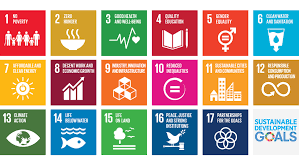The UN 17 Sustainable Development Goals: A Blueprint for a Better Future
The United Nations has set out an ambitious agenda to tackle pressing global challenges and create a more sustainable and equitable world by 2030. This agenda, known as the 17 Sustainable Development Goals (SDGs), covers a wide range of interconnected issues that are crucial for the well-being of people and the planet.
Goal 1: No Poverty
The first goal aims to eradicate poverty in all its forms and dimensions, ensuring that all people have equal access to resources and opportunities for a better life.
Goal 7: Affordable and Clean Energy
This goal focuses on promoting sustainable energy sources and improving energy efficiency to combat climate change and ensure access to affordable, reliable, and modern energy for all.
Goal 13: Climate Action
Addressing climate change is crucial for the future of our planet. This goal calls for urgent action to combat climate change and its impacts through mitigation and adaptation measures.
Goal 16: Peace, Justice, and Strong Institutions
Promoting peaceful and inclusive societies for sustainable development, providing access to justice for all, and building effective, accountable, and inclusive institutions at all levels are key components of this goal.
The UN’s 17 Sustainable Development Goals serve as a comprehensive roadmap towards a more sustainable future. By working together at local, national, and global levels to achieve these goals, we can build a better world for current and future generations.
Six Essential Tips for Advancing the UN’s Sustainable Development Goals
- End poverty in all its forms everywhere.
- End hunger, achieve food security and improved nutrition and promote sustainable agriculture.
- Ensure healthy lives and promote well-being for all at all ages.
- Ensure inclusive and equitable quality education and promote lifelong learning opportunities for all.
- Achieve gender equality and empower all women and girls.
- Ensure availability and sustainable management of water and sanitation for all.
End poverty in all its forms everywhere.
The United Nations’ Sustainable Development Goal of ending poverty in all its forms everywhere is a crucial step towards creating a more equitable and just world. By addressing the root causes of poverty and implementing targeted strategies to uplift those most vulnerable, we can build a society where all individuals have access to basic necessities, opportunities for growth, and a dignified standard of living. This goal not only aims to alleviate immediate suffering but also seeks to break the cycle of intergenerational poverty, paving the way for sustainable development and prosperity for all.
End hunger, achieve food security and improved nutrition and promote sustainable agriculture.
Achieving the goal of ending hunger, ensuring food security, improving nutrition, and promoting sustainable agriculture is crucial for creating a more equitable and sustainable world. By addressing issues such as food scarcity, malnutrition, and unsustainable farming practices, we can not only alleviate hunger but also enhance the overall well-being of communities and protect the environment. Through concerted efforts to support small-scale farmers, promote biodiversity, and implement sustainable agricultural practices, we can move closer to realising a future where everyone has access to nutritious food while safeguarding our planet’s resources for future generations.
Ensure healthy lives and promote well-being for all at all ages.
Ensuring healthy lives and promoting well-being for all at all ages is a fundamental aspect of the UN’s 17 Sustainable Development Goals. By prioritising access to quality healthcare, promoting mental and physical well-being, and addressing health inequalities, we can create a society where everyone has the opportunity to lead a healthy and fulfilling life. This goal not only benefits individuals but also contributes to building stronger communities and a more sustainable future for generations to come.
Ensure inclusive and equitable quality education and promote lifelong learning opportunities for all.
Ensuring inclusive and equitable quality education and promoting lifelong learning opportunities for all is a fundamental aspect of the UN’s 17 Sustainable Development Goals. By providing access to education that is of high quality and inclusive to all individuals, regardless of their background or circumstances, we can empower people to reach their full potential and contribute positively to society. Lifelong learning opportunities not only enhance personal growth but also drive innovation, economic development, and social progress. By prioritising education for all, we can create a more equitable and sustainable future for everyone.
Achieve gender equality and empower all women and girls.
Achieving gender equality and empowering all women and girls is a fundamental aspect of the UN’s 17 Sustainable Development Goals. By ensuring equal rights, opportunities, and representation for women and girls, we can create a more just and inclusive society where everyone can thrive. Empowering women not only benefits individuals but also has a positive ripple effect on families, communities, and economies. It is essential to address gender disparities in education, employment, healthcare, and decision-making to build a more equitable world for all.
Ensure availability and sustainable management of water and sanitation for all.
Ensuring the availability and sustainable management of water and sanitation for all is a critical aspect of the UN’s 17 Sustainable Development Goals. Access to clean water and proper sanitation facilities is essential for human health, well-being, and dignity. By prioritising efficient water usage, investing in infrastructure for water treatment and distribution, and promoting hygiene practices, we can improve the quality of life for communities worldwide while safeguarding precious water resources for future generations. This goal underscores the importance of equitable access to clean water and sanitation as fundamental rights that contribute to overall sustainable development.

